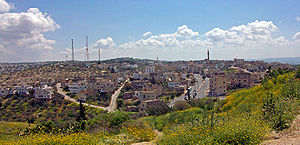Umm Qais
|
Umm Qais أم قيس Gadara (Ancient Greek) |
|
|---|---|
| Town | |

Umm Qais from north
|
|
| Location in Jordan | |
| Coordinates: 32°39′22.94″N 35°40′40.61″E / 32.6563722°N 35.6779472°E | |
| Country |
|
| Governorate | Irbid |
| Department | Bani Kinanah |
| Elevation | 1,240 ft (378 m) |
| Time zone | UTC+2 (UTC+2) |
| • Summer (DST) | UTC+3 (UTC+3) |
| Area code(s) | +(962)2 |
Umm Qais or Qays (Arabic: أم قيس, lit. "Mother of Qais") is a town in northern Jordan principally known for its proximity to the ruins of the ancient Gadara, also a former bishopric and present Latin catholic titular see.
It lies in the Bani Kinanah Department and Irbid Governorate in the extreme northwest of the country, near Jordan's borders with Israel and Syria. It is perched on a hilltop 378 metres (1,240 ft) above sea level overlooking the Sea of Tiberias, the Golan Heights, and the Yarmouk River gorge.
Gadara (Hebrew: גדרה, Gadʾara, or גדר, Gader; Greek: Γάδαρα Gádara) was situated in a defensible position on a ridge accessible to the east but protected by steep falls on the other three sides. It was well-watered, with access to the Ain Qais spring and cisterns.
A member of the Decapolis, Gadara was a center of Greek culture in the region, considered one of its most Hellenized and enjoying special political and religious status. By the third century BC the town was of some cultural importance. It was the birthplace of the satirist Menippus, a slave who became a Cynic philosopher and satirized the follies of mankind in a mixture of prose and verse. His works have not survived, but were imitated by Varro and by Lucian. The Greek historian Polybius describes Gadara as being in 218 BC the "strongest of all places in the region". Nevertheless, it capitulated shortly afterwards when besieged by the Seleucid king Antiochus III of Syria. Under the Seleucids, it was also known as Antiochia or Antiochia Semiramis (Ἀντιόχεια Σεμίραμις, Antiókheia Semíramis) and as Seleucia. The region passed in and out of the control of the Seleucid kings of Syria and the Ptolemies of Egypt. Gadara was captured and damaged by Alexander Jannaeus. In the early first century BC Gadara gave birth to its most famous son, Meleager. He was one of the most admired Hellenistic Greek poets, not only for his own works but also for his anthology of other poets, which formed the basis of the large collection known as the Greek Anthology. In 63 BC, when the Roman general Pompey placed the region under Roman control, he rebuilt Gadara and made it one of the semi-autonomous cities of the Roman Decapolis, and a bulwark against Nabataean expansion. But in 30 BC Augustus placed it under the control of the Jewish king Herod. The historian Josephus relates that after King Herod's death in 4 BC Gadara was made part of the Roman province of Syria.
...
Wikipedia

